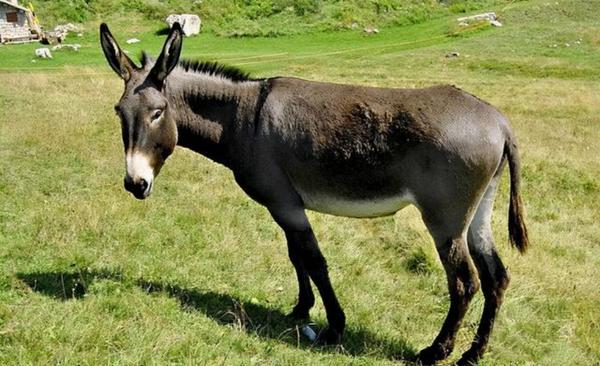
Why are mules destined to die if they become pregnant?
The phrase "mules are destined to die if they become pregnant" conceals a rarely understood mystery.
The term "mule" refers to the progeny of a horse and a donkey. I was genuinely surprised when I first discovered this fact.
These are clearly distinct species, so how can they unite and overcome the barrier of reproductive isolation to produce a "mule"?
We are all aware that reproductive isolation exists in the world, such as monkeys not being able to mate with ducks, snakes not being able to mate with chickens, and dogs not being able to mate with horses, among others.
Even humans cannot mate with other creatures in nature, which is known as "reproductive isolation." In other words, while reproductive isolation is a fact, mules are indeed the result of horses and donkeys mating. So, what is the explanation for this?
Understanding this question reveals why some say "mules are destined to die if they become pregnant," uncovering a rarely known secret behind it.
The tragic life of a donkey
Mules are the offspring of horses and donkeys, resulting from the union of two different species. Many may not realize that mules can be categorized into "hinny" and "mule" types.
Generally, the offspring of two different species tend to have significant defects, much like children born from incest among humans.
Most children born from incest suffer from serious defects, but mules are an exception to this rule.

Mules remarkably inherit the strengths of both horses and donkeys! Horses excel in running, while mules possess superior load-bearing and stress-resistant abilities, all of which are perfectly inherited.
Moreover, mules have a more docile temperament than horses and can carry heavier loads than donkeys, combining the best of both species and even evolving further, making them the epitome of "cross-species collaboration"!
In terms of lifespan, horse mules typically live around 20 years, while donkey mules often live over 30 years. However, whether they are "horse mules" or "donkey mules," they share a common trait: they "eat very little but work a lot," are hardworking, and are the epitome of "model workers" in the labor force.
In nature, few animals like mules exist as cross-species hybrids, possessing so many advantages.
People have recognized these qualities, leading them to repeatedly mate horses with donkeys to produce more mules, aiding in agricultural work and significantly reducing the burden of labor. Mules are indeed valuable helpers, but from another perspective, their lives are extremely tragic.
Why can horses and donkeys, two distinct species, produce mules?
Why can horses and donkeys, two distinct species, produce mules? Isn't there supposed to be reproductive isolation in the world?
We know that due to reproductive isolation, ducks cannot mate with snakes, dogs cannot mate with chickens.
Reproductive isolation refers to a mechanism that prevents closely related species from mating or producing fertile offspring, which is the definition of reproductive isolation.
Indeed, reproductive isolation exists, right? But note the phrase "closely related species producing offspring, or the offspring being infertile." Mules fall into this category. One parent is a donkey, the other a horse, and both share a common ancestor from long ago.
Over time, they evolved in different directions but still belong to the "Equidae" family. Therefore, they are related, explaining why they can produce mules when they mate.
Donkeys have 62 chromosomes, horses have 64, and mules have 63, so the offspring of horses and donkeys, mules, are infertile. This, combined with their "relatedness," still fits the definition of "reproductive isolation."
It's worth noting that mules are not considered a species but a hybrid, as a species must be capable of reproduction to be classified as such.
Why is it said that mules are destined to die if they become pregnant?
The claim that mules are destined to die if they become pregnant is a common pessimistic view. It is widely believed that mules are infertile, and even if a mule does become pregnant, it is under very rare circumstances. Some mules cannot give birth due to their inability to open their pelvic bones.
Instances of mules giving birth
The earliest recorded case of a mule giving birth is found in a book translated by a Russian, detailing an event around 600 BC during the siege of Babylon by the Persian Empire. A female mule in a transport team gave birth to a foal. In 1992, a German book also documented a case in Ettlingen where a female mule gave birth to a mule foal.
Why can some mules give birth despite being infertile?
Mules are the result of cross-species mating, and they are generally infertile, so why can some mules still give birth? This involves a specific biological concept.
All organisms contain genetic material—chromosomes, which vary in size, shape, and number across different species.
However, chromosomes always exist in pairs, with one from the father and one from the mother, known as "homologous chromosomes."
In distant hybridization, due to species differences, chromosome numbers, sizes, and shapes are often Asymmetry.
For example, horses have 64 chromosomes, and donkeys have 62, which is Asymmetry.
When mules attempt to form sperm or eggs, each chromosome lacks a corresponding homologous chromosome for pairing.
This random pairing can produce different gametes.
Only when the chromosomes in the gametes originate solely from either the horse or the donkey do these gametes have the potential to be fertile, which is why, on rare occasions, mules can reproduce, but the chances are extremely low.